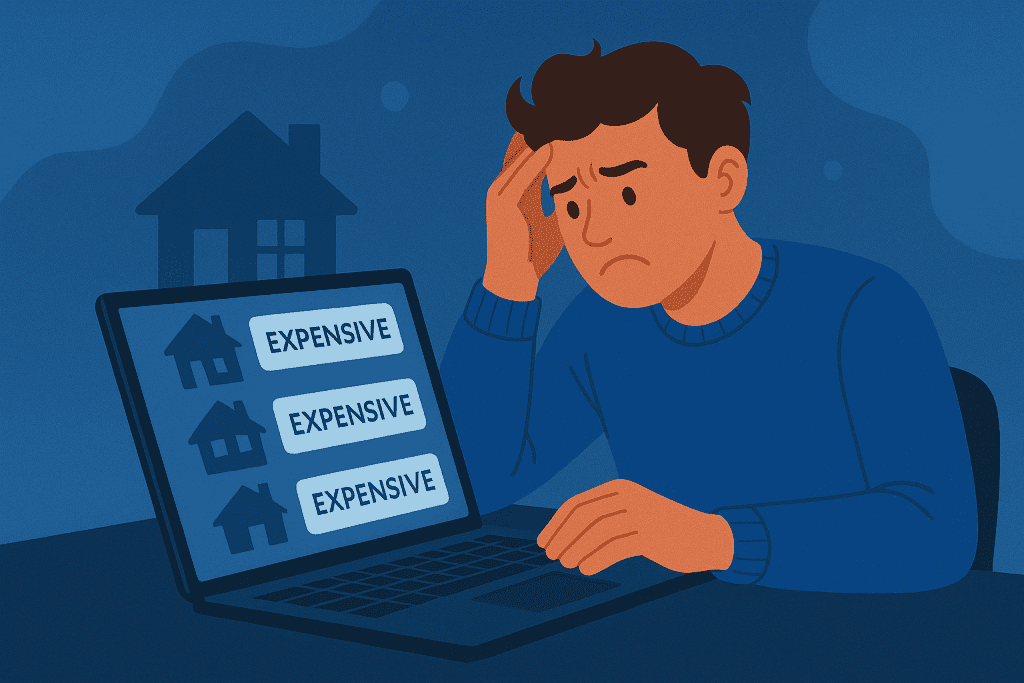
Is the housing market going to crash? This question is on everyone’s mind as home prices remain high, mortgage rates fluctuate, and buyers hesitate to make a move. Over the past few years, the real estate market has seen massive changes, leaving homeowners, investors, and first-time buyers wondering what’s next.
If you’re trying to decide whether to buy, sell, or invest, understanding market trends and future predictions is crucial. In this blog, we’ll explore housing market trends, projected home values, and expert insights to help you make informed decisions. By the end, you’ll know what to expect in 2024 and beyond.
Overview of the 2024 Housing Market
In 2024, housing market concerns have shifted from fears of a crash to questions of long-term stability. Unlike the 2008 crisis, today’s market shows fewer systemic risks. Home prices are steady, not falling sharply, and most homeowners hold fixed-rate mortgages with strong equity. These conditions reflect a correction driven by high interest rates and limited supply.
Mortgage rates have eased slightly but still affect affordability. Inventory remains low as many owners keep favorable loan terms. Demand continues in strong job markets, though buyers stay cautious. Investors now favor long-term strategies like rentals and real estate stocks. These trends show a market adjusting, not collapsing, and offer important insights for informed decision-making.
Key Factors Influencing the 2024 Housing Market
Several factors continue to shape the housing market in 2024. These elements influence price trends, buyer activity, and overall market stability.
- Investor Behavior: Higher rates have shifted investor focus from flipping homes to long-term rentals and real estate stocks for more stable returns.
- Interest Rates: After peaking near 7%, mortgage rates have slightly declined to around 6%. This modest improvement still limits affordability for many buyers.
- Housing Supply: Inventory remains low as homeowners with low-interest loans hesitate to sell. New construction has not kept up with demand.
- Buyer Demand: While not as strong as in past years, demand persists, especially in growing cities with job opportunities. Many buyers are waiting for better rates.
- Economic Conditions: Inflation has eased, but living costs and wage growth continue to affect affordability. A strong job market supports buyer confidence.
Pros and Cons of the 2024 Housing Market
Before making real estate decisions, let’s weigh the benefits and risks of today’s market.
| Pros | Cons |
|---|---|
| Mortgage rates are lower than in 2023 | Home prices are still unaffordable in some areas |
| Strong demand for rental properties | High property taxes and insurance costs |
| Less competition among buyers | Housing inventory remains tight |
| Market stability prevents a major crash | Economic uncertainty could impact future prices |
While 2024 presents challenges, there are still opportunities for buyers and investors who plan wisely.
In-Depth Analysis of the 2024 Housing Market

Understanding today’s market can help you make smart real estate decisions. Let’s break it down further.
Mortgage Rates & Affordability
Mortgage rates peaked at around 7% in 2023 and have since fallen slightly. In early 2024, the average 30-year fixed mortgage rate is around 6%, but affordability remains a challenge.
Buyers who locked in ultra-low rates in 2020–2021 are reluctant to sell, creating a housing shortage. Meanwhile, first-time buyers struggle with high home prices and interest rates that add hundreds of dollars to monthly payments.
Home Prices & Market Stability
While many expected prices to plummet, most markets have remained stable. Some regions with excess inventory have seen slight declines, but a market crash is unlikely.
Several factors are preventing a dramatic crash:
- Limited Supply – Fewer homes are on the market, keeping prices stable.
- Strong Demand in Growing Cities – Areas with job growth continue to see home price appreciation.
- No Widespread Foreclosure Crisis – Unlike 2008, most homeowners have strong equity and low fixed-rate mortgages.
Housing Market Comparison

How does 2024 compare to past years? Let’s look at the trends:
| Year | Mortgage Rates | Home Prices | Buyer Demand |
|---|---|---|---|
| 2020 | 3.0% | Low | Very High |
| 2021 | 3.2% | Rising | High |
| 2022 | 6.5% | Peaked | Low |
| 2023 | 7.0% | Declining | Low |
| 2024 | 6.0% (Projected) | Stable | Moderate |
Unlike 2008, the current housing market is not built on risky loans. Demand may fluctuate, but experts believe gradual corrections will replace any sudden collapse.
Investor Outlook and Market Strategies in 2024
Real estate investors in 2024 are rethinking their strategies in response to rising interest rates and shifting market dynamics. Many have moved away from short-term gains such as house flipping due to higher borrowing costs and tighter profit margins. Instead, investors are now prioritizing long-term rental properties, which continue to benefit from steady demand as affordability challenges push many households toward renting over owning.
Additionally, some investors are turning to indirect investments through real estate-related stocks. These include:
- REITs (Real Estate Investment Trusts): Offer diversified exposure to commercial and residential real estate without owning physical property.
- Home Construction Companies: Firms like D.R. Horton and Lennar benefit from new housing developments and infrastructure growth.
- Property Management Firms: Companies managing multi-family housing remain strong performers due to high rental demand.
This shift in investor behavior reflects a broader trend toward strategic, risk-adjusted planning in an unpredictable housing environment.
Conclusion: Will the Housing Market Crash in 2024?
The 2024 housing market is undergoing a necessary adjustment rather than heading toward a crash. Factors such as limited housing inventory, stable employment levels, and reduced foreclosure activity support market stability. While affordability remains a challenge and interest rates stay elevated, most regions are seeing gradual corrections rather than abrupt price drops.
For buyers and investors, this means the market still holds opportunity, but success will require a long-term approach, realistic budgeting, and a strong understanding of local trends. With proper strategy and timely action, navigating the real estate landscape in 2024 is possible without waiting for a market collapse that is unlikely to arrive.
FAQ
Is the housing market going to crash in 2024?
A full market crash is unlikely. While some home prices may drop slightly, experts predict a gradual adjustment rather than a sharp decline.
Is now a good time to buy a house?
It depends on your finances. If you can afford the current interest rates and home prices, buying now could be smart. However, waiting for lower rates might be beneficial.
What are the best trading strategies for real estate investors in 2024?
Long-term rentals and real estate stocks are strong investment choices. House flipping is riskier due to high borrowing costs.
Resources
- Bankrate. Housing Market 2025: What Experts Predict.
- Keeping Current Matters. Housing Market Forecast for 2024.
- LinkedIn. Is a Market Crash Coming?
- RealWealth. Will Housing Prices Drop in 2024?
- USA Today. Housing Market Projections for 2024.
